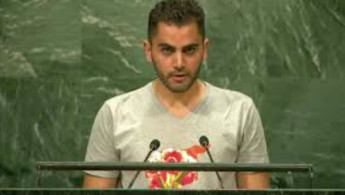Follow us on Twitter and Instagram to stay connected
Refugee summit must not deliver 'empty words': Palestinian-Syrian activist
"We need actions and we don't just need empty words," said Mohammed Badran, a 25-year-old Palestinian who in 2013 fled Syria for the Netherlands, where he founded a network of refugee volunteers to help the local community.
He is one of around 60 refugees taking part in the Global Refugee Forum in Geneva this week, where heads of state, government ministers, and business and civil society leaders are gathered to discuss ways to support refugees and host communities.
The forum, which officially opens Tuesday, is the first follow-up meeting after countries last December adopted the so-called Global Compact on Refugees.
Badran - who in 2016 was the only refugee to address the UN's refugee and migrants summit in New York - told AFP he was pleased to see a broader representation of refugees themselves at this week's event.
But he pointed out that refugees still make up "less than two percent of the total number of participants at the forum".
"We haven't reached that level where we really ensure meaningful refugee participation," he said, insisting that refugees themselves hold the keys to determining the best way of supporting and integrating displaced people.
At the end of 2018, nearly 26 million people were living outside their home countries as refugees.
Badran lamented that the conversation around them had been hijacked, with political actors painting refugees as a danger and a drain on the societies that host them in a bid to win points.
'Political pawns'
"Refugees are being used as pawns for political gains," he said.
To counter the negative narrative, it is important that refugees have the opportunity to get an education, work and contribute to the societies they live in.
Through Badran's organisation, for instance, some 600 refugees in the Netherlands volunteer to care for disabled children, help do gardening for their elderly neighbours, or provide Arabic classes among other tasks.
Read more: As UNRWA sexual misconduct allegations unfold, the international community decides to punish ordinary Palestinians
As refugees, "We have no money to do projects. We only have refugees as a human resource," he said, stressing the need to ensure "meaningful refugee participation" at a local, national and global level.
But today, refugee integration and participation is being blocked at multiple stages - beginning with the illegal and roundabout routes refugees are forced to take to reach safety.
He says he himself dished out around 15,000 euros ($16,700) to pay smugglers who helped him on his months-long Odyssey towards Europe, through Egypt, Lebanon, Ghana and Togo.
And he says each of his family members had paid a similar price.
"Basically all of our money went into this. We arrived and we had absolutely nothing," he said.
Badran has managed to build up his life from scratch in the Netherlands, creating his organisation and a consultancy, and finishing a bachelor's degree in anthropology this year.
"But it would be so much more efficient to use that money contributing and building a business, rather than spending it on trafficking," he said.
If countries opened legal and safer routes for people to take when fleeing for their lives, he said, more refugees might arrive with enough "resources to rebuild their lives without any help".
And when refugees arrive in a new country, their diplomas are often deemed incompatible or worthless, excluding skilled professionals like doctors from the workforce.
"It is absolutely a waste of resources," Badran said.
He said countries should make an effort to allow refugees access to the labour market.
Businesses should be open to working with refugees, and universities could make a truly useful contribution by offering more scholarships to refugees in host communities, he added.
Such moves, he said, would help "show that refugees are not just victims, but people who are actually contributing to society".





 Follow the Middle East's top stories in English at The New Arab on Google News
Follow the Middle East's top stories in English at The New Arab on Google News
![Both Hamas and the Palestinian Authority welcomed the ICC arrest warrants [Getty]](/sites/default/files/styles/image_330x185/public/2024-11/GettyImages-2178351173.jpg?h=199d8c1f&itok=TV858iVg)

